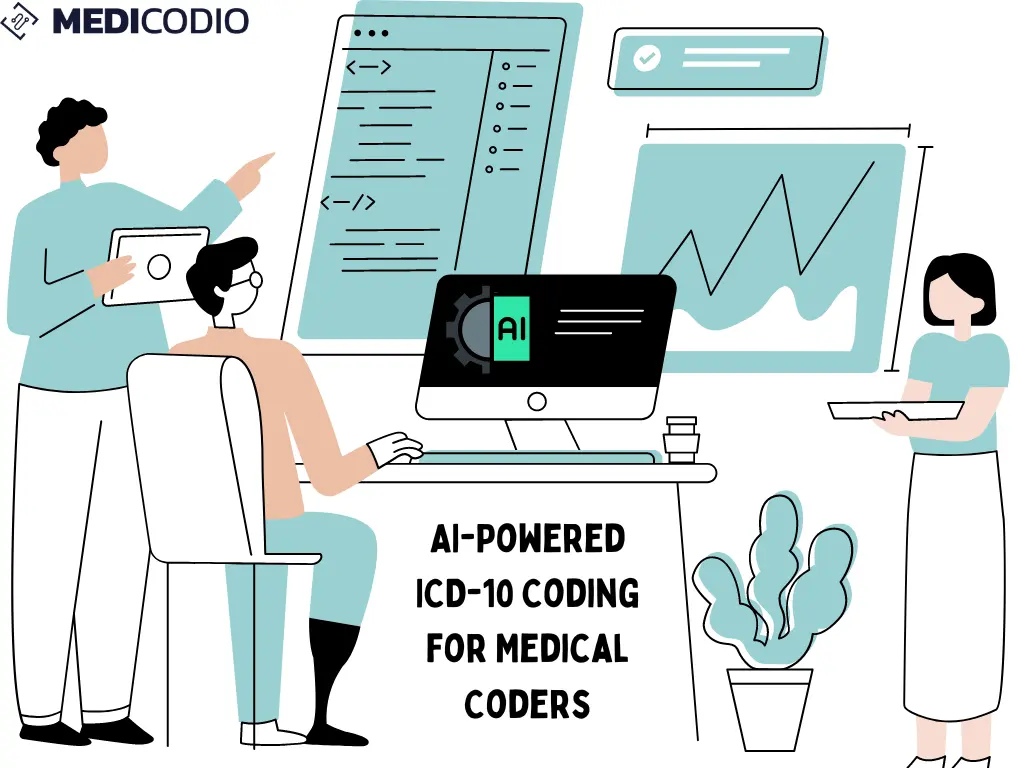In the ever-evolving landscape of healthcare, medical coders play a pivotal role in translating complex medical records into standardized codes that facilitate billing and record-keeping. The introduction of AI-powered ICD-10 coding assistants has brought about a paradigm shift in this field, revolutionizing the way medical coders work. In this comprehensive guide, we delve into the intricacies of AI-powered ICD-10 coding for medical coders, their benefits, challenges, and how they are shaping the future of medical coding.
AI-Powered ICD-10 Coding for Medical Coders: A Game-Changer
AI-powered ICD-10 coding has emerged as a game-changer in the medical coding domain. It combines the power of artificial intelligence and natural language processing to analyze medical documents and extract relevant codes accurately and swiftly. This advanced technology is designed to minimize errors and expedite the coding process, ultimately leading to more efficient healthcare documentation.
MEDICODIO’s AI Medical Coding assistant stands at the forefront of this transformative shift. This tool leverages state-of-the-art AI algorithms to analyze medical documentation and extract essential information for coding. Its intuitive interface and real-time suggestions empower medical coders to make informed decisions swiftly and accurately.

How AI Transforms Medical Coding
AI in medical coding is used to automate code searches, enhance precision, and expedite the coding process, leading to efficient healthcare documentation.
Enhanced Accuracy and Consistency
AI-powered systems excel in identifying and rectifying errors that might be missed by human coders. Through machine learning algorithms, these systems continually improve their accuracy by learning from vast datasets. As a result, medical coders can rely on AI to ensure consistent and error-free coding, reducing the risk of claim denials and billing discrepancies.
Rapid Code Extraction
Traditional medical coding can be time-consuming, often requiring coders to sift through extensive medical records to assign the appropriate codes. AI-powered ICD-10 coding streamlines this process by swiftly extracting relevant codes from the documentation. This not only saves time but also allows medical coders to focus on more complex tasks that require human expertise.
Real-Time Updates and Compliance
Medical coding standards and guidelines are subject to frequent updates. AI-powered solutions can instantly adapt to these changes, ensuring that the codes assigned are compliant with the latest regulations. This dynamic capability eliminates the need for coders to manually keep up with updates, reducing the risk of coding errors due to outdated information.
Overcoming Challenges with AI-Powered Coding
While AI-powered ICD-10 coding offers transformative benefits, it is essential to address certain challenges associated with its implementation:
Contextual Understanding
AI software might struggle with a nuanced understanding of medical context, potentially leading to incorrect code assignments. Collaborative efforts between AI and human coders are crucial to ensure accurate coding that takes into account the intricate medical details.
Data Security and Privacy
The sensitive nature of medical records demands robust data security measures. Organizations must ensure that patient information remains confidential and protected when integrating AI solutions. Implementing stringent security protocols is paramount to maintaining patient trust.
Conclusion
AI-powered ICD-10 coding has ushered in a new era of efficiency and accuracy in medical coding. By seamlessly integrating artificial intelligence and human expertise, healthcare facilities can optimize their coding processes, reduce errors, and improve patient care outcomes. While challenges exist, collaborative efforts between AI and human coders can harness the full potential of this revolutionary technology.
Schedule a Demo to Learn More about the AI Medical Coding Tool.
FAQs (Frequently Asked Questions)
Q: How AI is used in medical coding? A: AI is used in medical coding to swiftly analyze records, extract codes, enhance accuracy, and adapt to changing guidelines, boosting efficiency and reducing errors in healthcare documentation.
Q: What is automation in medical coding? A: It is the process of extracting patient data from physician notes and EHR systems and assigning appropriate codes based on the service provided automatically for accurate reimbursement.
Q: How does AI ensure compliance with changing coding standards? A: AI systems are designed to adapt to real-time updates, ensuring codes remain compliant with the latest regulations without manual intervention.
Q: What benefits do healthcare facilities gain from AI-powered coding? A: AI accelerates coding processes, reduces errors, and ensures consistency, leading to optimized revenue cycles and improved patient care.
Q: Are AI-powered medical coding solutions cost-effective? A: Yes, AI streamlines coding, leading to reduced operational costs, fewer claim denials, and faster reimbursements.
Q: What role does human oversight play in AI-powered coding? A: Human oversight is crucial to ensure accurate contextual understanding and address complex medical scenarios that AI might misinterpret.
Q: How can organizations address data security concerns with AI integration? A: Robust data encryption, access controls, and compliance with healthcare data regulations are essential to ensure data security.





